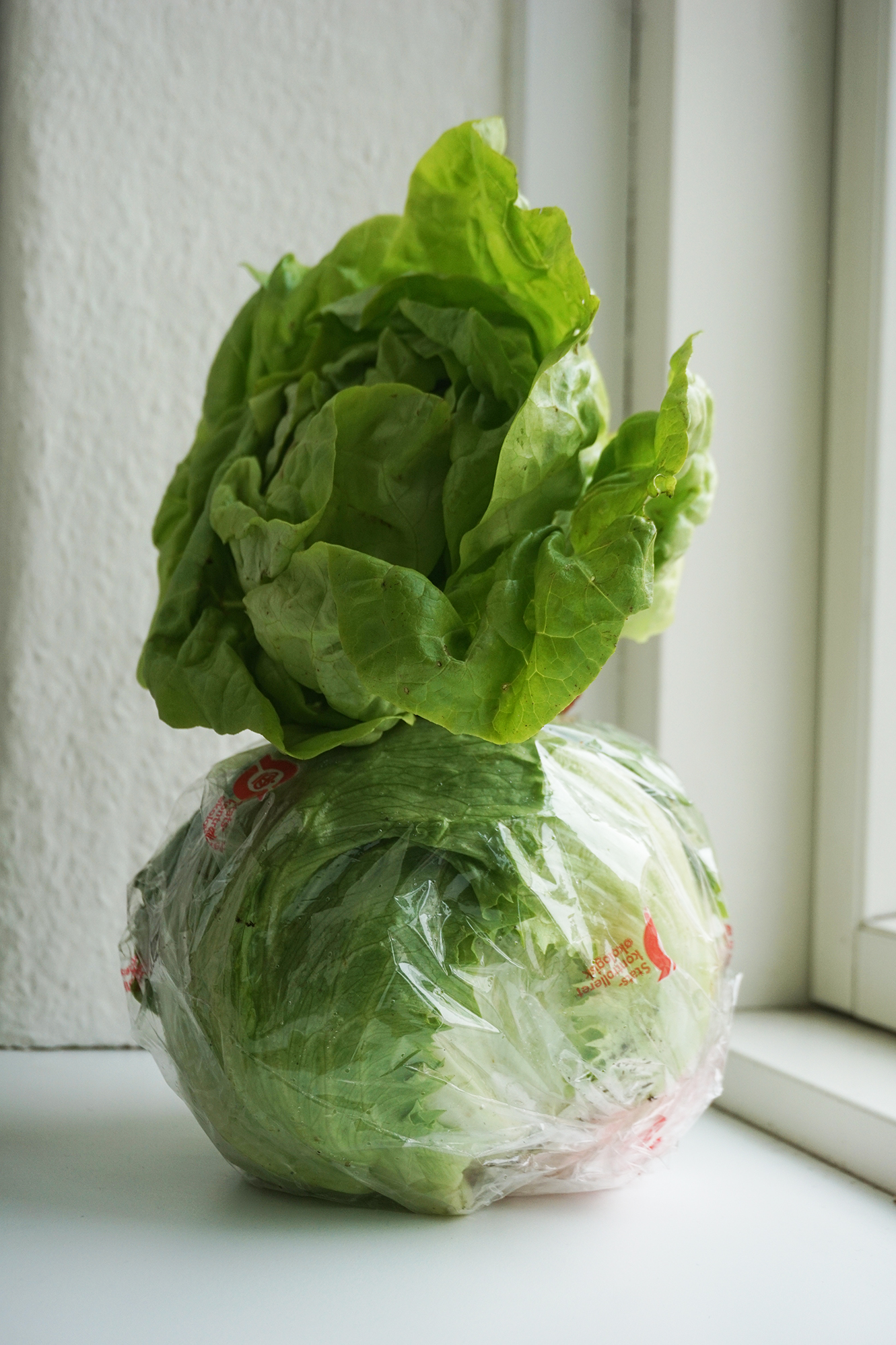This is by far the question I get asked the most, both in real life and also whenever I talk about zero-waste grocery shopping and food in general. And I understand why it is one of those dilemmas you run into the second you start to shop with sustainability in mind. So let’s take a look at the impact.
also check out: THE ULTIMATE LOW WASTE SHOPPING GUIDE
First of all, what is the problem with the packaging?
The majority of food packaging today is plastic, and most of it is unrecyclable, and even with the parts that are recyclable, it is nowhere near guaranteed that it will actually get recycled. About half of all waste from residential homes is plastic packaging, most of which ends up in landfills (EPA, 2014). Worldwide, between 6-14% of plastics are recycled, and about 8 million tons end up in the oceans every year (Miles Brignall, The Guardian, 2018). The big issue with plastic is that it does not break down, it just becomes smaller bits of plastic, and at this point, microplastic has been found in human bodies on all continents in the world, and even in embryos. The truth is we do not have a method of efficiently recycling plastic in a circular way, not one that is likely to become widely available to the extent that it can resolve the global issue of plastic pollution that is. And even when plastic is actually recycled, a piece of plastic can only be recycled 1-3 times, then new virgin plastic has to be added to the process to uphold the quality of the material. I of course have an impact video about plastic, so give that a watch for more plastic facts. Because of all these issues, it makes sense as a consumer to try and reduce the amount of plastic we use in our everyday lives, and one way of doing that is by choosing unpackaged products.

also check out: SHOPPING ONLINE OR IN-STORE // what is more sustainable?
Why is organic produce always wrapped in plastic?
Organic produce generally has a reputation of being more sustainable than the conventional options (and we will get into way in a second). However, if you have ever tried to buy organic produce in a supermarket (specifically not a farmers market) you will perhaps have seen that organic foods are often heavily packaged in plastic – in contrast to some conventional foods, which are more likely to be found unpackaged. General, my own experience is that the loose items in a grocery store are likely not organic, and I can see that many of you have made similar observations. Why is that? The industry has a few answers as to why that is:
- Organic produce should be easily disguisable from conventional produce, and the packaging makes them easy to tell apart – so there is an aspect of consumer communication and marketing involved
- Packaging is also used to protect the product during transportation from farm to the store – so there is a distribution aspect involved
- Some studies find that produce tends to last longer in packaging, so wrapping the food will decrease food waste – so there is a resource/environmental aspect as well.

also check out: I Tried Zero Waste Shopping In A Danish Supermarket // this is what happened
Let’s talk about the difference between organic and conventional produce.
If a food product has an organic label that refers to the farming methods and practices utilized during the production of the product. “Organic” is not interchangeable with terms like “natural” which can refer to specific ingredients in a product, and also nothing at all really. Organic farming is differentiable from conventional farming in several ways:
- Organic farming does not use synthetic fertilizers to promote plant growth, but rather employs manure or compost to fertilize the soil
- Organic farming does not spray pesticides to remove pests
- Organic farming does not utilize synthetic herbicides to manage weeds
- If we’re talking about animal ag, organic farming do not feed livestock antibiotics and medications to promote growth
- Organic farming also uses rotation crops to nourish the soil
There are definitely lots of reasons to choose organic produce, besides from avoiding pesticide residue in your food, which can cause serious health issues. The usage of synthetic pesticides and herbicides also cause vast environmental destruction, like the extinction of microorganisms and ecosystems, insect death, loss of biodiversity, and water and soil pollution. In the impact video about cotton, we also talked about how the people who are employed on the conventional non-organic cotton farms also experience a much higher rate of cancers, as a direct result of being exposed to high concentrations of pesticides and herbicides. This is also true in the food industry.

also check out: WHAT I EAT IN A DAY // vegan zero waste easy recipes + my daily trash reveal
Does packaging really have that big of an impact?
While the packaging is an important topic, especially from a sustainability point of view, the contents of the packaging account for a bigger part of the overall impact, than the packaging itself. Of course, this does not mean that we don’t have to care about plastic packaging altogether, but it does mean that it never makes sense to hyper-focus on one aspect of sustainability, like plastic, while ignoring other factors, like farming practices and conservation.
However, the boring and perhaps quite unsatisfying answer to the question “which should you choose: unpackaged conventional produce, or organic produce wrapped in plastic?” is that that is really up to you.
Of course, the most ideal and most sustainable option is to buy organic and locally grown produce at a local farmers’ market. This way you avoid plastic, but you also get organic and seasonal food, which is an absolute win-win. But I also know that not everybody has this option, and as a result, many people will have to fall somewhere in middle: avoiding some plastic, while also choosing some organic. Some consumers will also value organic produce more than avoiding waste, but this is still doing something great.
Can a vegetable change the system?
Overall, this seemingly small issue of what cucumber to choose actually uncovers some deep-rooted issues in our food systems today. And the reason why we can’t usually both go package-free and organic at the same time comes back to issues of efficiency, distribution, and profit-related faults in these systems. Plastic packaging is used because the widespread global food system is designed with a huge reliance on single-use packaging, and well as an overall dependency on convenience and overconsumption. Like we produce and package food in a way that makes us able to stack and transport as much as possible, yet 1/3 of all the food produced is wasted, lots of it before it even hits the shelves. So this is not only a consumer issue, it’s a political one too.
And I know you came to this video for a quick answer that could help you make an easy choice when grocery shopping, but sadly it just isn’t easy. It is almost like zero waste is impossible in a society not designed for it, trust me I know how frustrating it is to feel like if you strive towards an empty bin you will have to ignore the invisible issues in agriculture and industry-related emissions in order to do that. At least if you’re shopping in a conventional supermarket.

So let’s end this video with some quick tips:
- The EWG has made a list of produce that has the least and most pesticide residue, the products with the least residue could possibly be bought non-organic if the option to choose plastic-free is there. They go by the “the clean fifteen” and they are: avocados, corn, pineapples, peas, onions, papayas, eggplants, asparagus, kiwis, cabbages, cauliflower, cantaloupes, broccoli, mushrooms, and honeydew melon (Environmental Working Group, 2021)
- Contrastingly, the foods with the most pesticides residue are referred to by the EWG as “the dirty dozen”: strawberries, spinach, kale, nectarines, apples, grapes, peaches, cherries, pears, tomatoes, celery, and potatoes (Environmental Working Group, 2021), chose might be better to choose organic.
- Find out what produce is in season where you live, in seasonal produce, that is grown locally can have a tendency to the packaged less (and transported less), so choose those or base your meals on what is in season
- Find local food communities and groups and see if there is a farmers market nearby that you can support
- Choose with intention, as long as you have making informed conscious choices, you’re doing good. It’s not about being perfect, and there can be several factors that make certain choices hard or impossible, so do what you can, that’s all we can ask of each other.



